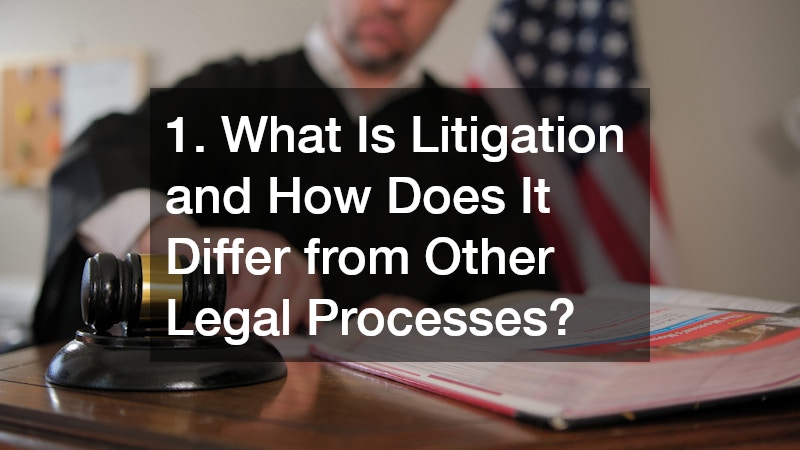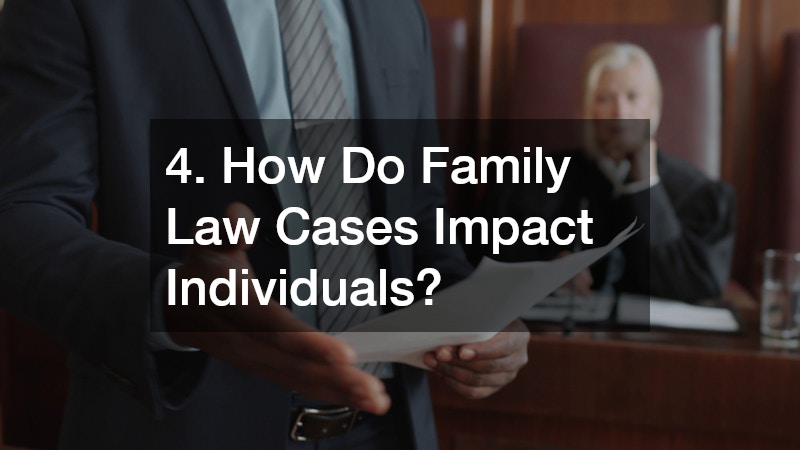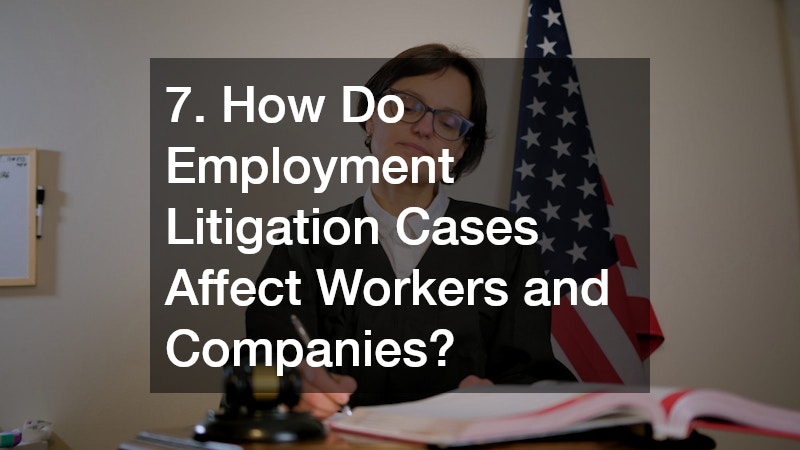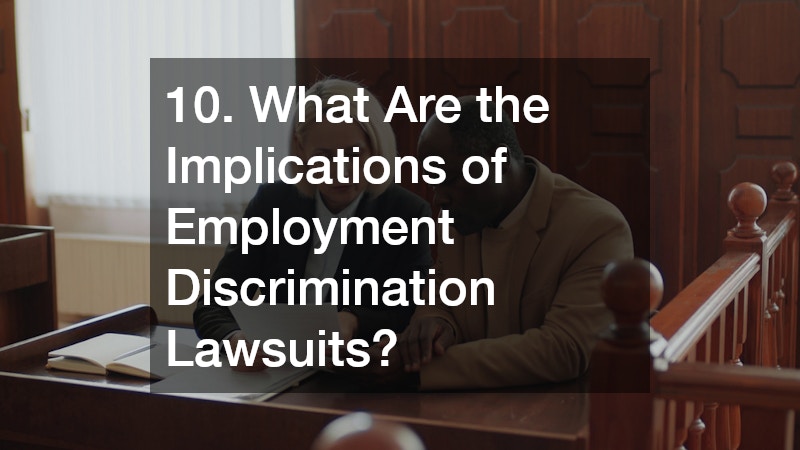In the complex realm of law, understanding the various litigation types is paramount for individuals and businesses alike. Litigation involves legal disputes that arise between parties and often require intervention by the judicial system. These cases can have significant effects, influencing everything from personal lives to corporate operations. With a growing prevalence of legal disputes across different sectors, the significance of litigation types cannot be overstated. As our society evolves, so do the legal challenges, making it essential to grasp how litigation processes affect the landscape of contemporary life. Whether it is a business facing a lawsuit or individuals embroiled in a family dispute, recognizing the different litigation types offers a clearer path to resolution and helps in mitigating impacts.
1. What Is Litigation and How Does It Differ from Other Legal Processes?

Litigation is a legal process that involves taking disputes to court, where a judge or jury can give a binding judgment. Unlike mediation or arbitration, which are alternative dispute resolution methods, litigation is often more formal and adheres to strict procedural protocols. This formal nature of litigation can make it a more time-consuming and costly endeavor.
Although litigation is a common route for resolving disputes, not every conflict requires such an approach. Alternative methods like mediation provide parties with more control over the outcome and are usually less adversarial. However, for some, litigation remains the preferred method to ensure a fair and transparent legal resolution.
A truck accident lawyer, for instance, might choose litigation to ensure that an injured party receives rightful compensation as determined by law. This illustrates the strategic use of litigation to address grievances that require authoritative legal judgment. Understanding when and how to use litigation effectively is crucial for any legal process.
2. How Does Civil Litigation Affect Individuals?
Civil litigation is a process where individuals or organizations seek to resolve personal grievances through the court system. This type of litigation is broad, covering everything from contract disputes to personal injury claims. Individuals involved in civil litigation will often need an injury lawyer to navigate the legal intricacies specific to their case.
The impact of civil litigation on individuals can be profound, both emotionally and financially. Legal proceedings can be lengthy and expensive, sometimes taking years to reach a conclusion. This can be burdensome, causing stress and anxiety for those involved.
An injury lawyer can play an essential role in civil litigation, especially in personal injury cases where the stakes involve compensation for damages. Their expertise can provide guidance and representation, making a complex process more manageable. Knowing when to engage with civil litigation and when to explore alternatives is a crucial skill.
3. What Are the Most Common Types of Business Litigation?
Business litigation often involves disputes over contracts, partnerships, and commercial transactions. These legal battles can significantly affect a company’s bottom line, reputation, and operations. Successful navigation of business litigation requires strategic planning and often the assistance of legal professionals such as a divorce attorney, who may handle partnership dissolution cases.
Common litigation types in the business world include breach of contract, employment disputes, and intellectual property challenges. Each of these areas poses unique challenges and requires a different approach to resolution. Choosing the right legal strategy is critical for businesses looking to protect their interests and minimize risk.
Engaging an experienced legal team can help businesses manage liability and navigate legal hurdles efficiently. Legal professionals specializing in business disputes are adept at crafting strategies that align with a company’s goals while addressing the specifics of litigation types. Recognizing the potential impact of business litigation is vital to sustaining growth and stability.
4. How Do Family Law Cases Impact Individuals?

Family law cases, often emotionally charged, involve legal issues related to familial relationships such as divorce, child custody, and support. Cases like these can profoundly affect the lives of individuals and the family unit as a whole. Custody attorneys, specifically, play a crucial role in representing clients’ interests in such sensitive matters.
The impact of family law litigation extends beyond legal outcomes; it can also affect emotions, finances, and future planning. Legal proceedings in family law can often be daunting due to the personal stakes involved. This dimension of litigation requires sensitivity and a thorough understanding of familial dynamics.
An experienced custody attorney can help clients navigate the complexities of family law, offering advice and support throughout the legal process. Their role is crucial in securing the best possible outcomes for parents and children alike. Understanding the nuances of family law litigation helps individuals prepare appropriately and manage their expectations.
5. Are Personal Injury Claims a Common Type of Litigation?
Personal injury claims are among the most prevalent types of civil litigation, encompassing accidents, negligence, and wrongful acts leading to injury. These cases often involve legal actions where the plaintiff seeks compensation for damages caused by another party’s actions. Criminal defense lawyers might sometimes be involved when a case has overlapping criminal implications.
The outcome of personal injury litigation can have significant financial implications for both plaintiffs and defendants. Successful claims can result in compensation for medical expenses, lost wages, and emotional distress. For defendants, particularly businesses, these cases can affect insurance premiums, operations, and public reputation.
Attorneys specializing in personal injury claims play a vital role in navigating the litigation. Their expertise not only involves legal acumen but also the ability to negotiate settlements when appropriate. Understanding personal injury litigation types lets individuals and companies better anticipate and manage potential risks.
6. What Role Do Product Liability Lawsuits Play in Consumer Protection?
Product liability lawsuits are a vital part of consumer protection, holding manufacturers and sellers accountable for defective or dangerous products. These cases can arise from a wide range of products, including consumer goods, pharmaceuticals, and vehicles. Domestic violence attorneys sometimes encounter product liability issues in cases where defective products contribute to domestic mishaps.
Such litigation ensures that companies prioritize safety and quality in their product offerings. The threat of liability prompts businesses to adhere to safety regulations and undertake rigorous quality assurance processes. For consumers, the existence of product liability litigation types offers a form of recourse for injuries caused by negligent business practices.
The outcome of product liability cases can lead to product recalls, changes in manufacturing standards, and enhanced consumer protections. Attorneys who specialize in this area work to secure compensation for victims while driving broader industry changes. Recognizing the importance of product liability litigation is crucial for maintaining consumer trust and business integrity.
7. How Do Employment Litigation Cases Affect Workers and Companies?

Employment litigation encompasses disputes between employees and employers, covering issues such as wrongful termination, wage and hour disputes, discrimination based on race, gender, age, or disability, and harassment in the workplace. These cases can arise from violations of federal laws like the Civil Rights Act, the Americans with Disabilities Act, or the Fair Labor Standards Act, as well as from breaches of state-specific labor regulations. The implications are significant, influencing not only company culture and individual career trajectories but also broader industry practices. SSI attorneys may also intersect with employment disputes, particularly when employees face discrimination or denial of benefits due to disability status.
Successful employment litigation can result in sizeable settlements, back pay awards, reinstatement, or workplace accommodations. Beyond financial compensation, these cases often spark policy changes and corporate restructuring, pushing organizations to adopt clearer anti-discrimination measures, stronger reporting procedures, and better employee protections. For employees, litigation provides a critical avenue to seek justice, reclaim dignity, and hold employers accountable. For companies, however, the risks extend beyond financial penalties—negative publicity can damage reputation, affect recruitment, and lower employee morale.
Experienced attorneys play a vital role in guiding clients through the complexities of employment law, gathering evidence, negotiating settlements, or pursuing litigation in court. Understanding the nuances of employment litigation helps both employers and employees make informed decisions, ultimately contributing to safer, fairer, and more equitable workplaces.
8. How Do Class Action Lawsuits Serve as a Form of Consumer Advocacy?
Class action lawsuits allow a group of people affected by the same issue to pursue legal action collectively, rather than filing numerous individual claims. These cases can be powerful tools for consumer advocacy, addressing widespread grievances against corporations, government entities, or other institutions. Examples include defective product claims, data breaches, deceptive advertising, and environmental hazards. A family law lawyer, although not typically involved in class actions, may still advise clients on whether joining such a case is in their best interest, particularly if family-related issues such as defective household products, unsafe housing, or fraudulent services are involved.
The initiation of a class action lawsuit sends a strong message to corporations and policymakers, often prompting industry-wide changes and creating precedents that prevent future misconduct. These cases can result in substantial financial compensation for affected groups, while also encouraging greater transparency, consumer protection, and corporate responsibility.
Attorneys specializing in class actions play a critical role in organizing plaintiffs, gathering large volumes of evidence, and navigating complex procedural requirements. Because these cases often involve significant resources and high stakes, their outcomes can influence not just the parties involved but entire industries. Recognizing the role of class action lawsuits highlights their importance as both a legal remedy and a social tool for accountability.
9. How Does Real Estate Litigation Affect Homeowners and Investors?
Real estate litigation involves legal disputes concerning property rights, transactions, and development. Homeowners, investors, landlords, tenants, and developers can all find themselves party to such litigation types, which may involve title disputes, boundary disagreements, zoning issues, landlord–tenant conflicts, construction defects, or breach of contract. Even seemingly minor matters, such as easement rights or disagreements with homeowners’ associations, can escalate into legal battles that require court intervention. In some cases, local accident lawyers may find intersections with real estate disputes, particularly when accidents or injuries occur on poorly maintained properties, raising questions of liability and premises safety.
For homeowners and investors, real estate litigation can have a direct effect on financial stability and long-term investment returns. Disputes may delay or derail property transactions, prevent planned developments, or significantly reduce property value. Litigation can also lead to high legal expenses, costly repairs, or forced compliance with regulatory standards, all of which contribute to unexpected financial strain.
Professional legal guidance is indispensable when navigating these complexities. Experienced attorneys clarify stakeholder rights, analyze contracts, ensure compliance with local laws, negotiate settlements, and, if necessary, represent clients in court. Appreciating the nuances of real estate litigation types helps individuals and businesses safeguard their interests, minimize risks, and make informed decisions about property ownership, development, or investment.
10. What Are the Implications of Employment Discrimination Lawsuits?

Employment discrimination lawsuits address unequal treatment of employees based on race, gender, age, disability, or other protected characteristics. They serve to uphold workplace equality and can significantly impact corporate practices and policies. Drug charges attorney might, in rare circumstances, handle cases where drug-related discrimination arises within employment contexts.
The implications of employment discrimination litigation are profound, influencing workplace dynamics and employer liability. These cases can lead to substantial financial compensations, enforce company policy changes, and enhance compliance with anti-discrimination laws. For plaintiffs, they offer a pathway to justice and ensure their livelihoods are protected under the law.
Experienced attorneys in employment law are crucial in advocating for clients, ensuring their voices are heard and their rights defended. Recognizing the impact of employment discrimination litigation types is essential for fostering equitable work environments. Such awareness encourages a more socially responsible corporate landscape and empowers employees to insist on fair treatment.
Understanding the various litigation types is essential for individuals, businesses, and society at large. These legal disputes can affect our daily lives, influence business outcomes, and shape societal standards. By recognizing the different kinds of litigation and their implications, we can better navigate the legal landscapes that impact our communities. In an ever-evolving legal environment, awareness and preparedness become key to successfully managing and mitigating these challenges. Ultimately, knowledge of litigation types empowers individuals and organizations to engage effectively with the judicial system.







